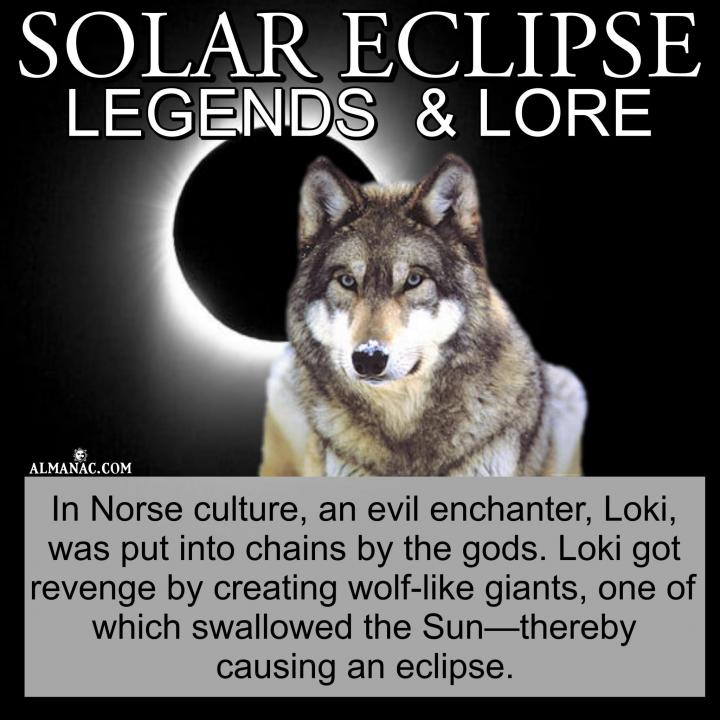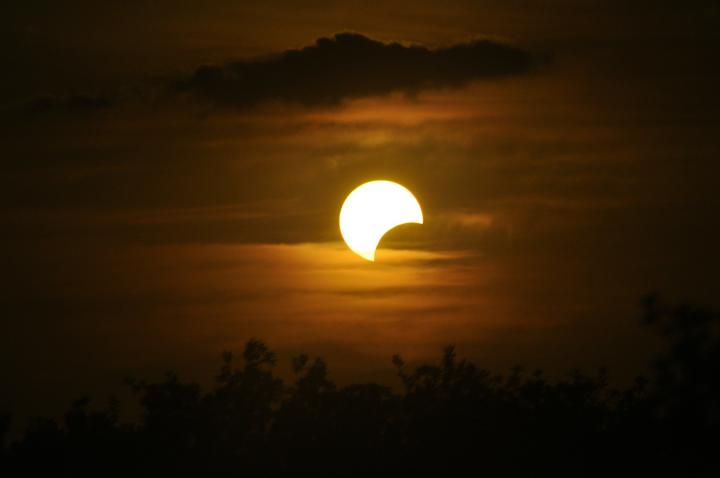Here at the Almanac, we love our folklore and mythology—and there’s nothing like a total solar eclipse to get folks wondering why the Sun disappeared from the sky! Here are the most interesting stories and superstitions.
With the stunning spectacle of the April 2024 Total Solar Eclipse coming up, it’s fun to read about how ancient people explained what happened with the Sun—the source of our light and life—during a total eclipse.
Eclipses in Storytelling
In A Connecticut Yankee in King Arthur’s Court by Mark Twain, his hero (who is transported back to Camelot) gets captured but avoids being hanged with a wave of his hand, seemingly making the Sun go dark.
“For a lesson, I will let this darkness proceed, and spread night in the world; but whether I blot out the sun for good, or restore it, shall rest with you.”
Of course, our hero remembered the date of a historic (and conveniently timed) eclipse of the Sun. Fortunately, the Medieval people thought he had the magical ability to blot out the Sun! Our hero is then proclaimed “The Boss” by the King, and sets out to modernize Camelot with knowledge of the future.
A Total Eclipse and Fear
For many people in ancient times, a total solar eclipse generated fear. They thought the world would end or a great evil would follow.
Myths often involved a beast trying to destroy the Sun with the fate of Earth hanging in the balance—or, a Sun-god becoming angry, sad, or sick.
For example:
- Native people in Colombia shouted to the heavens, promising to work hard and mend their ways. Some worked their gardens and other projects especially hard during the eclipse to prove it.
- In Norse culture, the gods put an evil enchanter, Loki, into chains. Loki got revenge by creating wolflike giants, one of which swallowed the Sun—thereby causing an eclipse. (Another of the giant wolves chased the Moon, trying to eat it.)
- Fear led Chippewa people to shoot flaming arrows into the sky to try to rekindle the Sun. Tribes in Peru did the same for a different reason; they hoped to scare off a beast attacking the Sun.

- In India, the demon spirit Rahu steals and consumes the nectar of immortality but is beheaded before he can swallow it. His immortal head flies into the heavens. The Sun and Moon had alerted the gods to his theft, so he takes revenge on them: When Rahu swallows an orb, we have an eclipse—but the orb returns to view because Rahu has no body!
- Similarly, in China, Mongolia, and Siberia, beheaded mythical characters chase and consume the Sun and Moon—and we experience eclipses.
- In Indonesia and Polynesia, Rahu consumes the Sun—but burns his tongue doing so and spits it out!
- In Armenia, a dragon swallowed the Sun and Moon.
- In Transylvanian folklore, an eclipse stems from the angry Sun turning away and covering herself with darkness, in response to men’s bad behavior.
- In India, many believe that when an eclipse occurs a dragon is trying to seize the two orbs. People immerse themselves in rivers up to their neck, imploring the Sun and Moon to defend them against the dragon.

A Total Eclipse and Romance
Some cultures thought that the Sun was in a fight with its lover, the Moon! Others found a different kind of romantic explanation.
- To the Australian Aborigines, the Sun was seen as a woman who carries a torch. The Moon, by contrast, was regarded as male. Because of the association of the lunar cycle with the female menstrual cycle, the Moon was linked with fertility. A solar eclipse was interpreted as the Moon-man uniting with the Sun-woman.
- In German mythology, the hot female Sun and cold male Moon were married. The Sun ruled the day, and the sleepy Moon ruled the night. Seeking companionship, the Moon was drawn to his bride and they came together—thus, a solar eclipse.
- Some Native Americans drew on a similar concept: that a solar eclipse was a visit of companions.
- West Africans of Benin switch the gender roles of the Sun and Moon and suggest that the orbs are very busy, but when they do get together, they turn off the light for privacy.
- In Tahitian myth, the orbs are lovers who join up —providing an eclipse—but get lost in the moment and created stars to light their return to normalcy.
A Solar Eclipse and Weather
It’s no surprise that weather associated with an eclipse might spark some interesting theories.
- The fog or dew or other precipitation resulting from an eclipse was considered dangerous.
- The Japanese thought that poison would drop from the sky and covered their wells.
- In Transylvania, they believed that eclipses could cause plague.
- Alaskan natives believed that the moisture and dew could cause sickness; dishes were turned upside down; affected utensils were washed.
Solar Eclipses and Human Behavior
Even today, people still hold some fear regarding solar eclipses!
- As recently as 2010, during the near annular (very large partial eclipse), out of fear, people stayed home. Few were on the streets, restaurants and hotels saw a dip in business (many customers preferred not to eat during the event), and most schools closed when students did not show up.
- In Cambodia, in 1995, instead of screaming and banging during a solar eclipse, soldiers shot into the air to scare the mythic dragon from the sky. It was reported that the only scattered casualties were from the bullets.
- In Baja, California, in 1991, astronomers were surprised by the weeping and wailing of hotel staff, who were terrified by the onset of darkness.
There are many more examples, but the human response that stands out the most is related to pregnancy…
A Total Eclipse and Superstitions
Many ancient people worried that an eclipse caused pregnancy issues such as blindness, cleft lips, and birthmarks.
Even today, there are some beliefs in superstitions! Pregnant women are sometimes warned to stay inside, not eat, not carry sharp objects, and not eat cooked food prior to the eclipse.
Modern baby blogs ask if pregnant women should wear some sort of metal, such as a safety pin, to protect the baby.
Some say that baby superstitions date from the Aztecs, who believed that a celestial beast was biting the Sun and that the same thing would happen to a baby if the pregnant mother watched.
Of course, none of this is true! The only health warning is: Do not look at the Sun, as it can (and will) damage your retina. See how to view a solar eclipse safely.

Eclipse as a Good Luck Charm
Eclipses did not incite fear in at least one group: Bohemia’s miners. They believed that the event portended good luck in finding gold.
Some North American Indian tribes believed that an eclipse was simply nature’s way of “checking in” with the sky, perhaps a sort of cleaning house. The Sun and the Moon temporarily leave their places in the sky to see if things are going all right on our planet Earth.
The Strange Science of Eclipses
Long before the invention of the telescope. people across the world recorded the motions, position, and appearance of the Sun.
Some, like the Aztecs and the Babylonians, were obsessive enough to make astoundingly accurate observations that ultimately gave their priests the power of prediction.
The Babylonians
In the 7th to 6th century BCE, the Babylonians noticed that an eclipse with all the same specific traits would exactly repeat after 18 years plus 10 or 11 1/3 days. This observation was amazingly perspicacious, especially since that “1/3 day” business ensured the next eclipse would be best seen (or maybe only seen) in an entirely different region of the world.
Babylonians called this period “a Saros.” The Saros’ “1/3 day” fraction means Earth turns through 120 degrees of longitude for each subsequent event. For the same type of eclipse to again appear in an observer’s region, one has to wait while eclipses work their way around the world like a set of gears, which requires three Saroses. Then those “1/3 day” fractions add up to a full Earth rotation, bringing the spectacle back to the original location, albeit with a slight shift.
This time period of three Saroses, an important observational interval with the curious name of exeligmos, amounts to 54 years plus 33 days. As this surpassed the usual lifespan of the Babylonians, it was amazing they noticed the cycle at all.
The Greeks
The ancient Greeks loved that “Saros” concept so much that they embraced it without even changing it to their own language.
This account from the Greek historian Herodotus also shows that the common people were quite fearful of total solar eclipses. In the 5th century BCE, Herodotus reported on the army ear when the Moon temporarily covered the face of the Sun:
“…just as the battle was growing warm, the day was all of a sudden changed into night. This event had been foretold by Thales, the Milesian, who forewarned the Ionians of it, fixing for it the very year in which it actually took place. The Medes and Lydians, when they observed the change, ceased fighting and were alike anxious to have terms of peace agreed on.”
Solar Eclipse: What Really Happens
Total solar eclipses are a cosmic coincidence indeed. How else do you explain that the Moon is 400 times smaller than the Sun but also 400 times nearer to us? This makes the only two disks in our sky appear the same size! It would not be the case if either were larger, smaller, nearer, or farther away. In fact, over time, our Moon will travel further from Earth, and we won’t experience the same phenomenon.
Of course, now we understand the science of eclipses. We no longer tell stories to explain why the Moon or the Sun went dark. Still, there’s a certain magic to these stories, isn’t there? Perhaps the romance comes from knowing that all is well with the Sun and the Moon.
See when future solar (and lunar) eclipses will happen!













